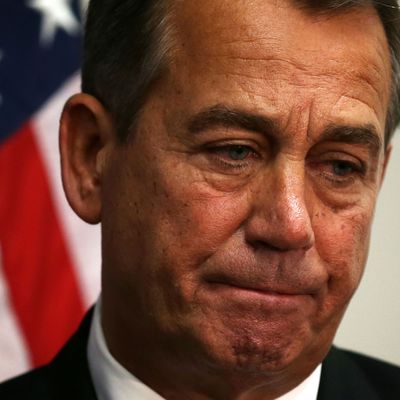
The right-wing critique of Big Government — bloated, wasteful spending with no real purpose that imposes huge costs on the market — is basically wrong, but there’s one major piece of the government in which it’s completely right: agriculture policy. The farm sector is a vast archipelago of socialism sitting amid a free-market economy. Agri-socialism commands essentially zero intellectual support. Conservatives hate it. Liberals hate it. Experts or academics who study it tend to say things like, “It’s so astonishingly irrational, it just takes your breath away.” Agri-socialism operates largely in a self-contained world dominated by the economic interests that benefit from it. So, for instance, the “National Milk Producers Federation” can say things like, “This supply management provision is crucial to ending low milk prices,” as if maintaining high prices were a sensible public policy goal.
Basically, there is no reason at all for the government to single out farmers for special support, as opposed to any other kind of business owners. If I were looking to cut domestic spending, or even if I weren’t, farm subsidies would be the first thing to go, the most unjustifiable government program of any significant size. It’s worth noting that the budget figures don’t nearly capture the cost of agriculture subsidies, much of which come in the form of quotas and tariffs that result in higher consumer prices but don’t entail writing checks from Washington.
Unfortunately, even though congressional Republicans are looking to cut domestic spending, most of them regard agriculture subsidies as an especially meritorious program, not an especially awful one. Some of them want to cut it deeply or even do away with it, but not enough. And the main dynamic that prevents reform, and the reason the farm bill ultimately went down on the House floor today, is that the conservatives who do want to cut agriculture subsidies will only do it if they can also kick the living crap out of the poor.
Agriculture subsidies have traditionally been bundled together with food stamps, in order to create a legislative coalition. (Farmers like the fact that food stamps mean more people can buy their food.) But in recent years, conservatives have gone from tolerating food stamps to absolutely loathing them. This year, House Republicans have attached to their farm bill deep cuts in food stamps, which have grown costlier because the recession has vastly increased the number of poor, hungry Americans (and not, as many Republicans claim, because of loose eligibility standards).
The House farm bill imposes enormous food-stamp cuts, many of them in the form of staggeringly punitive conditions. It would cut off for eligibility, for instance, anybody with even a few thousand dollars of assets, including a modest car, which would force some families to choose between a vehicle they may need to get to and from work and food stamps. It would deny food stamps to anybody ever convicted of a violent crime, even decades before. That state of affairs being considered not punitive enough, the House voted the other day to let states deny food stamps to the unemployed — which is to say, you lose your job, and your family also loses the thing that lets it keep eating. That latter amendment carried the support of all but six House Republicans, including Paul Ryan, most recently seen trying to rebrand himself as a Kemp-style bleeding-heart lover of the poor.
The food-stamp issue has imposed a deep partisan overlay on the agricultural issue. The House is essentially divided into four camps: (mostly rural) Democrats who want to keep spending on agriculture subsidies and food stamps, urban Democrats who like food stamps but not agriculture subsidies, Republicans who want to cut food stamps but not agriculture subsidies, and Republicans who want to cut everything. The farm bill died because the Republicans who want to cut spending on everything teamed up with the Democrats who object to cuts for food stamps.
It would be imaginable to assemble a trans-partisan coalition to slash or eliminate agriculture subsidies if the conservative Republicans were willing to give up their demand that doing so also include enormous cuts in food stamps. But House ultraconservatives want to cut agri-socialism only to the extent that they want to cut all domestic spending, and especially spending for the poor.
The House leadership’s plan was to pass its farm bill combining mostly status quo agriculture subsidies with immiseration of the poor, and then go to a conference and strike a deal with the Senate, which passed a bill that mostly preserves the status quo for both. (The prospects for agri-socialism reform are far worse in the Senate — House Democrats usually represent urban areas, but all the senators represent entire states, and every state has farms, so hardly any senators want to get farmers off the dole.)
The failure of the House farm bill is actually yet another self-defeating rebellion from the right. The ultraconservatives could have formed a coalition with liberals who like food stamps to cut agri-socialism. Or they could have formed a coalition with Republicans who like agri-socialism but hate food stamps. Instead, they decided neither one cuts enough money and sunk the bill altogether. It’s actually tragic that there’s finally a large block of Republicans willing to slash the worst domestic program in government, but they’re too crazy and hateful to actually get it done.






























